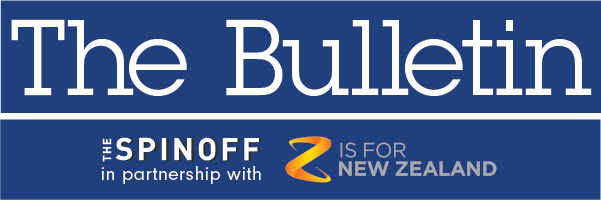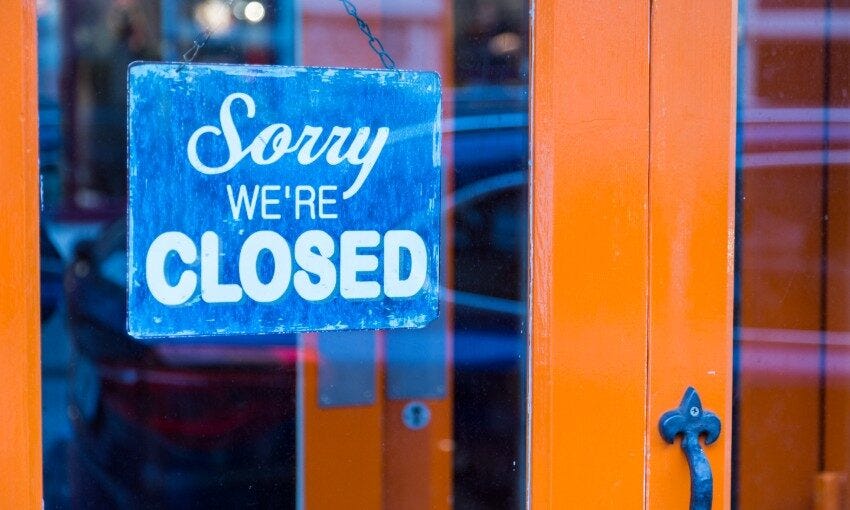Business subsidies extended in Auckland for longest lockdown
With a record lockdown in the city, no new support programmes have been announced as some businesses call for permanent subsidies
Mōrena and welcome to The Bulletin for Tuesday, September 14, by Justin Giovannetti. Presented in partnership with Z Energy.
In today’s edition: The future of the elimination strategy, a new housing milestone for the country and good news Bruce, but first, businesses ask for more support.
These signs are going to stick around for at least another week in Auckland. (Getty Images)
Wage subsidies have been extended alongside Auckland’s lockdown, but they’re effectively over for most businesses outside the city. As Stuff reports, the extension is only available to businesses that can directly link a fall in revenues to Auckland’s lockdown and not to level two restrictions in the rest of the country. That’s a change from previous rounds of support payments that were available to any business impacted by the delta outbreak. The result is that ongoing subsidies will be quite limited in level two areas, the prime minister said yesterday.
The business sector has felt real pain in recent weeks and some leaders have called the lockdown extension devastating. The Auckland business chamber has accused the government of ignoring the economic and social costs of the lockdown with its decision to extend level four, according to the NZ Herald. “There has to be a better way,” the head of the chamber said. Retail NZ echoed the feeling, calling it “devastating”. Treasury has estimated that about a quarter of the city’s economic output is stalled during lockdown, meaning about $100 million in lost activity daily.
Many business owners are more optimistic, with ANZ saying that the economy is currently defined by resilience. There’s light at the end of the tunnel, even in Auckland, an ANZ survey of business has found. Interest reports that most businesses are confident in their long-term projections and most indicators are in the green. There is also another business subsidy, the resurgence support payment, being extended across the country to help pay for rent and other fixed costs. The government says it has paid out $1.8 billion so far in wage subsidies and another $531 million in resurgence payments.
Some industries have been hit far worse than others, including hospitality, hotels and South Auckland businesses. The Spinoff reports that a number of bar and restaurant owners are meeting virtually to come up with a strategy to survive. Other industries are making requests for cash. The country’s hotels have lost $1.5 billion since Covid-19 hit, according to the NZ Herald (paywalled). The hotel council says it now wants the wage subsidy at all alert levels until international tourism is restored, something it warns could be four or more years away. In South Auckland, some businesses might be able to adapt to level three click-and-collect, but it could be weeks or even months before a return to good levels of foot traffic, Stuff reports. Some have called for an extension of the wage subsidy for hospitality even at level two.
There’s been no indication of new financial support programmes, despite billions set aside for delta last week. For finance minister Grant Robertson, these requests could come with a large price tag at a time when other groups are also looking for help, from renters to students and organisations trying to combat poverty. Robertson got approval from parliament last week to spend up to $41 billion on unexpected expenses coming out of the delta outbreak, a massive amount of money that he said he doesn’t expect to spend in its entirety. Billions of what is effectively a government overdraft will need to be borrowed before it can be spent. Jenée Tibshraeny wrote for Interest about the new cash, which received surprisingly little attention when it was brought to parliament.
If you like what you’re reading, we need your support. The Spinoff is doing our utmost to keep you updated on Covid-19 related news. Every dollar our members contribute directly funds our editorial team and is devoted to ensuring we do more. Click here to learn how you can support the team today.
With Auckland remaining in lockdown for another week, David Seymour calls for elimination rethink. RNZ reports the Act leader says it’s time to consider changes to the elimination strategy until vaccination levels get high enough to start a broader reopening. Seymour said that with increasing case levels in recent days he's concerned that five weeks of level four lockdown won't be enough and cabinet could consider another extension. He called for a hard border around the city and suppression instead of elimination in Auckland, which would allow businesses to reopen.
Tova O'Brien also wrote for Newshub that the government should at least explain when the country will stop relying on lockdowns. While the prime minister said “no one wants to continue to use lockdowns” yesterday, she wouldn’t say whether this was the last one. A month ago the government unveiled a reopening plan. Last week, the Covid-19 minister said that the plan was being rewritten due to delta. Hours later, the prime minister contradicted him and said it wasn’t. It hasn’t become clearer in the days since what the long-term strategy is.
The Covid numbers: 33 new community cases were reported yesterday and 35% (7) of the previous day’s cases were active in the community while infectious. All the cases were in Auckland. 955 cases have now been detected in the delta outbreak and 372 have recovered. 33,866 people were vaccinated yesterday.
Seven Auckland suburbs are now at the centre of attention after mystery Covid-19 cases continue to appear. People in the suburbs are being asked to consider going for tests, even if they don’t have symptoms, RNZ reports. Getting a sense of the situation in Mount Eden, Massey, Māngere, Favona, Ōtara, Papatoetoe and Manurewa will be essential to whether the city can move down alert levels next week.
A “lost generation” looms as a quarter of the world's schools are in danger of collapse. The UN has estimated that nearly 1.5 billion children have been kept out of classes by Covid-19 and climate change, The Guardian reports. While the situation in poorer countries has been complicated by poverty and war, even developed countries are struggling to get classes back. In some parts of the northern hemisphere, students are now in their second year of classes interrupted by Covid-19. I've spoken with parents overseas in recent days worried about how their kids will cope after years of virtual classes and fleeting social contact.
The average house price in New Zealand has hit another milestone: $1 million. OneRoof reports that prices have increased $213,000 over the past year and the average deposit is now $200,000, up almost $50,000 since last September. The average property in Auckland, Wellington, Tauranga and Queenstown is now over $1 million, with Hamilton, Napier, Hastings, Nelson and Whangarei about to cross the millionaire line. Some in the industry have called the milestone a reality check, while the government has said its programmes to make housing more affordable haven't kicked in yet.
Meanwhile, my family home in Canada, a tidy four-bedroom brick bungalow with a large yard, is currently on the market for $250,000.
A Matamata street has been split in two by trees. The Waikato Times reports that the residents of Tamihana street are going to war after council told them that tall palms trees would not be replaced after they were felled. Council told residents that a newly free strip of grass could either see native trees replanted, left empty or something else. Only half of people responded, and many of them wanted nothing. Now everyone has an opinion. It's a neighbourhood squabble that’s led to people calling birds “filthy”, dissing native trees and calling for the palms to remain.
Bruce is the New Zealander we all need right now. He's a kea, a very clever kea who lost most of his upper beak and hasn't let that slow him down. He's believed to be the first kea seen to pick up a tool. He's figured out how to use pebbles to preen himself. Stuff has the story of how Bruce has put his special talents to work and he's just getting on with it. Good on ya Bruce.
Got some feedback about The Bulletin, or anything in the news?
Get in touch with me at thebulletin@thespinoff.co.nz
Right now on The Spinoff: Emma Vitz adds up all the flat whites and haircuts we haven't paid for in lockdown and what it means for the economy. Pattrick Smellie opines that delta and vaccinations have likely made this past outbreak the last national lockdown. Don Rowe finds that storytelling, through film and television, is helping keep Māori culture alive. Mirjam Guesgen reports that a sensitive electronic nose could sniff out Covid-19 cases. Mary Argue writes that Afghans in New Zealand are struggling to cope with their whānau facing life under the Taliban.
For a feature today, an explanation of how Pfizer makes its Covid-19 vaccine. With millions of New Zealanders getting the jab, The New York Times has a visual feast that slowly walks you through the process. It's quite striking and really helped me understand what's going on. One thing that occurred to me reading, and really watching the many videos, is that not only was this vaccine developed in a year, but a sophisticated industrial process was also engineered that spans continents. Set aside five minutes or more for this story.
An All Blacks team that seemed disjointed last year is anything but now. RNZ reports that the team on the field is a little different from expected, due to injuries and border issues, but the All Blacks have responded under captain Brodie Retallick. Players that usually didn’t get top-billing are now filling that starting jersey and hammering out tries. The team looks strong. After beating the Pumas over the weekend, they face a rematch and then back-to-back tests against South Africa.
That's it for The Bulletin. If you want to support the work we do at The Spinoff, please check out our membership programme.







